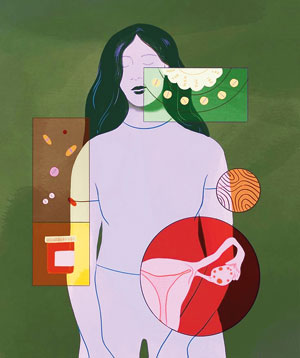Period Irregularities? Here’s Why! Understanding PCOS
View(s): Let’s talk a health condition which 25% of the female population has, but goes unrecognized until later on. Once a female starts her first menstrual cycle, it continues until she goes through menopause. The menstrual cycle length is between 21 to 35 days. Menstruation happens due to the hormonal changes the female reproductive system goes through. If a female faces any irregularities in the menstrual cycle, which includes, no periods (amenorrhea) followed by heavy and prolonged bleeding it is something you should be concerned about.
Let’s talk a health condition which 25% of the female population has, but goes unrecognized until later on. Once a female starts her first menstrual cycle, it continues until she goes through menopause. The menstrual cycle length is between 21 to 35 days. Menstruation happens due to the hormonal changes the female reproductive system goes through. If a female faces any irregularities in the menstrual cycle, which includes, no periods (amenorrhea) followed by heavy and prolonged bleeding it is something you should be concerned about.
Polycystic Ovarian Syndrome (PCOS) is hormonal condition which affects many women of reproductive age. This becomes a problem later on in life , when she is trying to conceive. That is why it is important to identify this condition and take measures to control it. Even though this is called PCOS, it is actually a metabolic condition, meaning it affects the body’s metabolism and therefore not limiting the symptoms to the reproductive organs alone. PCOS, is set to be renamed as ‘Metabolic Reproductive Syndrome’ in the near future.
Whilst symptoms of PCOS varies from person to person, the common symptoms include features of hyperandrogenism: excessive hair growth in the face and body (hirsutism), severe acne, hair loss, oily skin. Having few menstrual periods or having periods that aren’t regular is a very common sign of PCOS. While it may seem quite convenient, it is also something which you should be concerned about.
Poly Cystic Ovaries, as the name suggests, is due to formation of multiple, fluid-filled sacs. Ovaries tend to produce high levels of a male-sex hormone called androgens, which interrupts with ovulation, causing irregular periods, and cosmetic problems as mentioned above.
So why are we worried about this condition? Since this is a metabolic condition, if it isn’t controlled it can cause future cardiovascular risks including heart attacks, high blood pressure and increased cholesterol levels, it leads to fertility problems, higher risk of uterine cancer, and can causes diabetes as well.
There is no cure for PCOS. You can only control the symptoms and prevent the symptoms from occurring. The mainstay of treatment is lifestyle modifications. Obese women are at higher risk of having PCOS. Research has found out that if 5-10% of the body weight is reduced, then the symptoms will subside. So, if you’re 100 kg, losing 10kgs will work! However, losing weight for women with PCOS can be more difficult. The goal for the weight loss should be in small amounts, measurable, achievable targets and realistic. Losing weight will include a comprehensive diet plan in which the key goal is to create a calorie deficit, and improve the quality of food which is taken. Consuming anti-inflammatory foods like berries, oily fish, leafy greens will reduce the inflammatory aspect of the disease. If you have symptoms of insulin resistance, you can follow a low glycemic index diet, like whole grains, legumes, nuts. Adequate exercise will help to lose weight as well as to improve insulin sensitivity. Moderate exercises like brisk walking, jogging, cycling and swimming will be useful. It is recommended to exercise 60 minutes for at least 2-3 times a week.
If you’re a woman with a normal ranged BMI and have these symptoms, do these apply to you as well? The answer is yes! There is a type called lean PCOS, one that doesn’t involve being overweight and obese. You may have a normal body weight now, but the chances of going into obesity in the future is high and that is why it is important to keep up with a healthy lifestyle to avoid future complications.
You must be wondering how PCOS is diagnosed right? It is perfectly normal to be having irregular periods as soon as you attain puberty. Which is why this diagnosis is made 8 years after puberty, or if you’re over 20 years old. There’s simply no need to worry before that.
When these symptoms are present during that time, you should go to your gynecologist and an ultrasound scan as well as blood tests will be performed in order to confirm the diagnosis. Based on your needs, symptoms and fertility wishes a plan will be curated. It may include medicines, or simple advice on lifestyle modifications.
There are oral medications which are available to treat symptoms like excessive hair growth, irregular periods, and fertility problems. They include combined oral contraceptive pills, metformin a diabetes medication which helps lower androgen levels, and help to ovulate regularly.
This can actually cause a range of emotional symptoms, including anxiety, depression and low self-esteem. That is why it is important to address the mental-well being aspect as well. It is important for women with PCOS to prioritize self-care and stress management. Poly Cystic Ovarian Syndrome can be controlled easily with the right care and discipline.
Priyanjalaa Sumanasekara
Faculty of Medicine,
University of Kelaniya.
HitAd.lk is the best and biggest mobile phone market in Sri Lanka, and we guarantee you will find what you need here from our extensive listing of mobile phones for sale in Sri Lanka. Whether it’s a budget-priced smartphone for communication, or higher end features with advanced connectivity, there are many different options from which to choose from on our site!


